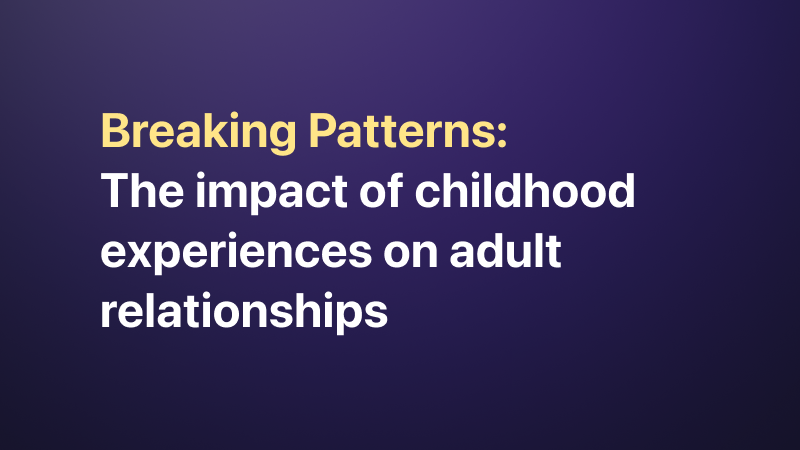How Your Childhood Shapes Your Love Life (And What You Can Do About It)
Ever wonder why your partner’s quirks drive you up the wall? Or why you keep repeating the same old relationship dance, no matter who you're with? Spoiler alert: The answers may have more to do with your childhood than you think. The good news? Once you know what’s going on, you can break the cycle and build a better love life.
Why Childhood Matters More Than You Think
We all have a relationship blueprint — a subconscious playbook of how love, connection, and conflict should go down. And guess what? Most of it was drafted long before your first crush. Your childhood experiences, especially the way you were treated and the dynamics you observed, shape your beliefs about relationships. Were your parents emotionally available, or did they have their own drama? Did you feel seen and heard, or were you always trying to earn love?
Think of it like the operating system of your heart — outdated software that you keep running even though it’s buggy and prone to crashes. Understanding these patterns isn’t about blame; it’s about updating your system for smoother interactions.
Common Childhood Patterns That Sneak Into Your Relationships
-
The Pleaser vs. The Avoider
If you grew up in a home where love felt conditional, you might be a people-pleaser. You’re always trying to keep the peace, even if it means ignoring your own needs. On the flip side, if you were taught to avoid conflict or emotions, you might be the person who clams up or runs away when things get heated. -
The Fixer-Upper
If you were the “little helper” as a kid, always smoothing things over, you might find yourself playing therapist to your partners. You take on their issues like a DIY project, convinced that you can “fix” them. But here’s the catch: you’re not Home Depot. -
The Emotional Rollercoaster
Grew up in a chaotic environment? You might find calm boring and seek drama as proof of passion. You might pick fights or get overly intense because that's how you learned to connect. -
The Shut-Downer
Maybe you were told to “suck it up” or “stop crying,” and now, you keep everything bottled up. You’re the one who says, “I’m fine” even when you’re far from it, which can make it hard for your partner to connect with you on a deeper level.
Breaking the Patterns: How to Rewrite Your Relationship Story
-
Spot Your Patterns
The first step is figuring out which old tapes you’re playing. Pay attention to how you react when things go south. Do you withdraw? Do you go on the attack? Identifying your go-to moves can help you understand what’s driving them. -
Name the Origin
Once you see your pattern, ask yourself: Where did I learn this? Connecting the dots between your past and your present can take the power out of old habits. It's like flipping the light on in a dark room — suddenly, it all makes sense. -
Experiment with New Moves
Changing old habits isn’t about going from zero to zen overnight. It’s about trying something different in those heated moments. Instead of shutting down, try expressing just one feeling. Instead of jumping into fix-it mode, ask your partner what they actually need from you. -
Celebrate Your Wins
Notice when you break the pattern, even in small ways. Did you speak up when you normally wouldn’t? Did you hold back when you wanted to go all-in fixing mode? These little victories add up, helping you build a new, healthier relationship dance.
Self-Reflection Question:
- Think about a recent argument or disagreement with your partner. How did you react, and does that reaction remind you of anything from your childhood? What’s one small change you could try next time?
Quick Quiz: Are You Bringing Your Childhood Into Your Love Life?
-
When your partner seems distant, do you:
- a) Get anxious and try to reconnect right away
- b) Pull away and keep to yourself
- c) Get annoyed and pick a fight
-
During conflicts, are you more likely to:
- a) Talk it out right then, even if it’s messy
- b) Shut down and wait for it to blow over
- c) Try to fix things, even when you’re upset
-
When something bothers you, do you:
- a) Bottle it up and move on
- b) Express it right away, no matter the consequences
- c) Drop hints and hope your partner figures it out
Remember, breaking old patterns is like learning to dance to a new beat. It might feel awkward at first, but with practice, it can change the rhythm of your relationship for the bette




